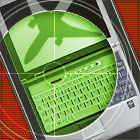Buying your next laptop computer or smartphone online could suddenly get a lot more expensive if a little-known U.S. Department of Transportation proposal to tighten rules around the shipment of small, battery-powered devices by air goes through, says an industry group opposing the move.
Airline passengers would be affected too, as rules banning spare lithium-ion batteries in checked-in luggage would also be extended to alkaline and nickel metal-hydride batteries, argues George Kerchner, executive director of the Washington D.C.-based Portable Rechargeable Battery Association.
“It will be a nightmare for passengers,” Kerchner said.
On January 8, the department’s Pipeline and Hazardous Materials Safety Administration (PHMSA) announced plans to eliminate exceptions on small lithium cells and batteries, defined as less than 100-watt hours in capacity (typical laptop batteries hold 60-80 watt-hours).
Small lithium batteries are considered a class 9 hazardous material, a miscellaneous category which includes dry ice and magnetized goods. Batteries under the 100 watt-hour limit had long been exempted from the rules.
The PHMSA, in consulting with the Federal Aviation Administration (FAA) with related legislative committees, says undoing the exception will force vendors and transport companies to use stronger packaging and cut down on the number of accidents.
“Under existing regulations, a flight crew may not be made aware of a pallet containing thousands of lithium batteries on board the aircraft, yet a five-pound package of flammable paint or dry ice would be subject to the full scope of the regulations,” said Minnesota Democratic representative and House Transportation and Infrastructure chairman, Jim Oberstar, in a statement. “That makes little sense,”
The full text of the Department of Transportation’s proposal can be viewed online, and people may also leave comments.
Kerchner says that instead of stricter rules, we’d be better off with stricter enforcement of existing rules.
The proposed changes would affect everything from power tools to defibrillators and iPads. Even button battery-powered hearing aids would be impacted, he said.
And by making the U.S. stricter than the International Civil Aviation Organization that governs the rest of the world, Kerchner said, it will require manufacturers and shippers to make sweeping, costly changes to how they package, label and ship consumer electronics and computer goods.
For instance, the battery inside an already-padded box for a new notebook PC might need to be packaged in an additional fiberboard box along with extra shipping documents, he said.
It could also mean untold numbers of workers overseas and in the U.S. will have to get “fully-regulated hazmat” training to simply handle a box with an iPod or HP laptop inside, Kerchner said.
“We’re talking about billions of dollars,” he said. Those new costs will likely be passed on by manufacturers and shipping companies to customers.
“If you buy a digital camera and want it delivered next-day-air, that might an additional $30 to $40 that the shipper is not going to absorb,” he said. “It will have a huge impact on online sales.”
The proposed changes would likely affect all consumers to a degree, he said, since electronics goods, because of how quickly they lose value, tend to be shipped via air from factories in Asia to the U.S. rather than sent by ship.
Neither the Department of Transportation nor the House Aviation Subcommittee responded to requests for comment. A major snowstorm was expected to hit Washington D.C. on Friday and many workers stayed home.
For air travelers, the department would also prohibit air passengers from keeping extra alkaline or rechargeable nickel-metal-hydride (NiMH) batteries in their checked-in luggage. Those batteries are acceptable if they are inside the devices. They are also permitted inside or outside devices if stored in carry-on luggage.
The rule changes would also require electronics goods to be carried in cargo sections that either have fire suppression systems, or are accessible by the pilots in case of a fire. Kerchner said that is impractical and would lead to, in many cases, electronics goods piled right behind the cockpit.
While he acknowledged the department’s figure of 40 air transport-related incidents since 1991 involving lithium batteries and devices powered by lithium batteries, Kerchner said it is a small number in the context of the 3.3 billion lithium batteries transported in 2008 alone.
“What we’ve found is that when shippers are in full compliance, there have been no incidents,” he said. “The industry has an excellent safety record.”
Source: Eric Lai, Computerworld




